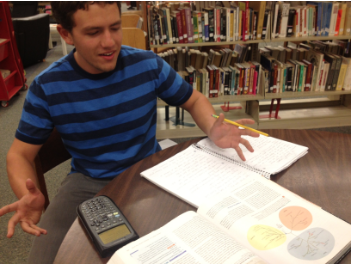
Palo Alto High School’s Advanced Placement Biology course is partway through its second year using a changed curriculum, designed to better prepare students for the AP exam after scores on the newly revised test shifted dramatically last year.
Nationwide, only 5.5 percent of test takers earned a score of 5 out of 5 in 2013, according to the College Board, a drop from around 20 percent in previous years. In comparison, around 18 percent of students scored a 5 on the AP Chemistry test, and 30 percent scored a 5 on AP Physics C.
“I heard the test was really hard — impossible,” senior Samuel Mignot, a current AP Biology student, said.
Despite the anxiety the reduction in scores has caused many of this year’s AP Bio students, not all of last year’s students saw the exam as especially challenging. The number of Paly students earning a 5 was significantly more than average at 15 percent, according to Erik Olah, who teaches the course, though this was still a decline from the previous year.
“The test was okay — we learned a lot of the things in class and if you had reviewed the material, then you’d be fine,” said senior Kevin Zhang, who took the test last spring. “But most people went into Bio thinking it was very easy. They didn’t review, so I guess it’s their own fault.”
Olah maintains that the lower amount of 5s does not reflect less knowledge on the part of the students.
“We’re not doing worse, necessarily,” Olah said. “It’s because [the College Board] changed the way they score [the test].”
The College Board redesigned the test after the 2012 school year and administered it to 1200 college students and professors to calibrate the scoring; the end result was the major drop in the number of 5s for high school students. However, the number of students scoring the minimum 1 also dropped, so the mean score remained about the same.
In addition, the College Board changed the structure of the test, reducing the number of, and changing the nature of, multiple choice questions and adding grid-in questions.
“It used to be facts, like ‘How many ATP do you get from the Krebs Cycle?’” Olah said.
The test now has many more interpretive questions, including more analysis of diagrams, according to Olah. The test still covers the same range of topics, however.
“[The] material is mostly the same — there’s a few things they took out,” Olah said. “There wasn’t really anything added.”
In response to the new test, Paly’s AP Bio teachers have revised the course’s curriculum over the past two years in order to better prepare students. The teachers now integrate 13 labs recommended by the College Board into the experimental aspect of the class, and have rewritten the class’s tests to better reflect the AP exam.
The changes to AP Biology are meant to reflect advances in biological research and emphasize the importance of experimentation and explanation, rather than memorization of details, according to the College Board.
“The body of scientific knowledge is constantly expanding,” Gaston Caperton, president of the College Board, said when the changes were announced in 2011. “The revisions will help science educators ensure that their instruction is fresh and current and that students develop not just a solid knowledge of the facts but also the ability to practice science and think critically about scientific issues.”
Olah took a similar position on the changes.
“They’re trying to get an inquiry-based science,” he said. “[By] memorizing facts, are you really learning science? By doing that? But if you learn the concepts and can apply the concepts, then you’re learning science, you’re learning the process. It’s more about concepts in the bigger picture rather than in detail.”


